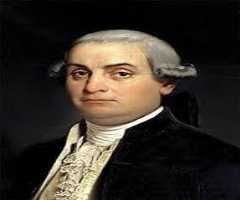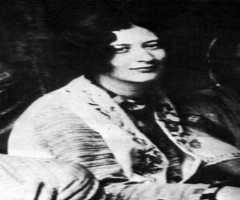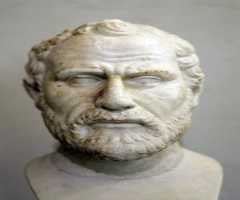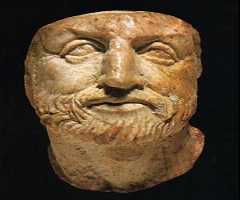Socrates Biography, Life, Interesting Facts
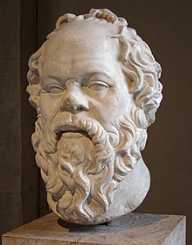
Birthday :
Died On :
399
Birth Place :
Zodiac Sign :
An Athenian born, Socrates lays the ground as an all-time philosopher. He was a Greek teacher who played with words as his own. One of his most original methods was to use the ‘LACA’ teaching method. His students learned how to Listen, Ask questions, Criticize as well as Challenge the stated answers. Socrates believed in bringing forth the Western social norms and beliefs. His probing technique gave rise to what is called the ‘Socratic Method.’
Early & Teen Life
In 470 BC, Socrates was born in Athens, Greece. His father, Sophroniscus was a hardworking Stoneman. His mother Phaenarete was a well-known midwife. Following his father’s footsteps, Socrates started with sculpture study and later went in search of his belief. By the same token, he wanted to uncover the meaning of life and its virtue.
It is likely that Socrates didn’t have a formal education due to their family’s middle background. As he tried to find his calling, he took the stonemason posting as his profession. Only a dash of this philosopher’s life is known. Distinguished philosophers wrote most of his works and life experiences. His favorite students, Xenophon and Plato, have made an enormous contribution to his philosophical methods.
Picture of his Philosophical Thought
Not only is his work used in philosophy but also as a quick tool for scientific analysis. However, his invention “Socratic method” extended with fewer promises and bounds of mysteries. With incredible skills at his disposal, Socrates didn’t pin down a single word or any writing. What most people claim about him is based on long-established writings.
Aristotle and Thucydides also wrote a glimpse of his philosophical work and life. Other than the direct roles of four mentioned authors, there’s no additional legal information about him. In other words, sketching his life and logical study turns out to be a frantic activity.
It is equally vital to add that Plato is thought to have brought the best of Socrates existence. However, some historians suggest that Plato’s and Socrates grind duplicate each other. The end tone is that a Greek philosopher, Xenophon is regarded for having valid intelligence of Socrates’s information.
Public Teaching as Reflected by Associate’s Work
Plato’s ideas gave rise to Socrates’s meaning of happiness. He neatly expressed his words in different grading. First grade is called ‘The Euthydemus’ second grade of happiness is titled ‘The Symposium’ and the third and final grade is ‘The Republic.’ Socrates set of happiness include:
First Grade: The Euthydemus
It is also called ‘The Eristic.’ Some historians claim that it was a ‘false’ dialogue. In simple terms, he argued that wisdom or sagacity alone is good for the human soul. He also stated that ignorance is the only mistake that human being make.
On the whole, Socrates instituted major things; 1) every living being on earth desire happiness which in turn brings about a definite end. 2) Bright things don't merely define satisfaction but how people use them. For instance, wise people use apparent elements such as money for their good. However, ignorant beings waste the given commodity to no good use.
Second Grade: The Symposium
As state by Plato, the Symposium is an impromptu dialogue experienced during a dinner party. They share an act of love that Socrates briefly defined as the love of the Greek god (Eros).
Plato and Socrates believed that the unity from the universe was instigated by nothing else than philosophy. In all, others have proved the statement wrong by giving it another meaning according to what they believed. For instance, a Christian scholar, Thomas Aquinas interprets that pure happiness crops up from God.
On the other hand, other philosophers such as Arthur Schopenhauer argue that happiness originates from nature, music, and art. At the end of it all, it depends on what makes you happy.
Third Grade: The Republic
Plato went further and discussed how Socrates proves that The Republic reflected the proof of whether the person is just or not. He contemplated that a fair-minded spirit lives longer with content.
As Plato had argued in the second category, Socrates wish was to give people an essence of what happiness is all about. The Argument brought forth loads of questions and contradictions between joy, pleasure, and morality.
The Socratic Method
The great philosopher collections are peacefully kept in memorabilia of the biographers, Plato and Xenophon. The Socratic Method comprised of a questionnaire methodology such as what is happiness? The questions were given to those who were confident and transparent to answer.
Well, countable of his students didn’t agree to his teachings. Why? They averted that he was at his please to expose liars and frauds. A claim called that his teachings made the young to let go of their morals. In turn, this made him have more enemies and fewer friends. Several of Socrates students despised his Socratic method. There was nothing that came out of it other than perusing their ignorance, and hypocrisy. After all the contradiction, he calmly responded that ‘He knows nothing.’
At 70, his judgment called for testing the wisdom of those who were much wiser than his ideologies. He lodged a punishment of free dinner and a weekly wage. However, his proposal was rejected since he wasn’t ready to worship the states god. His second charge was that of introducing the supreme powers that weren't bargained for.
Socrates was pronounced guilty and was offered a relief as soon as he pays the fine. His refusal sent him to an early grave. He died in Classical Athens in 399 BC.

